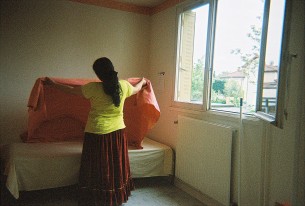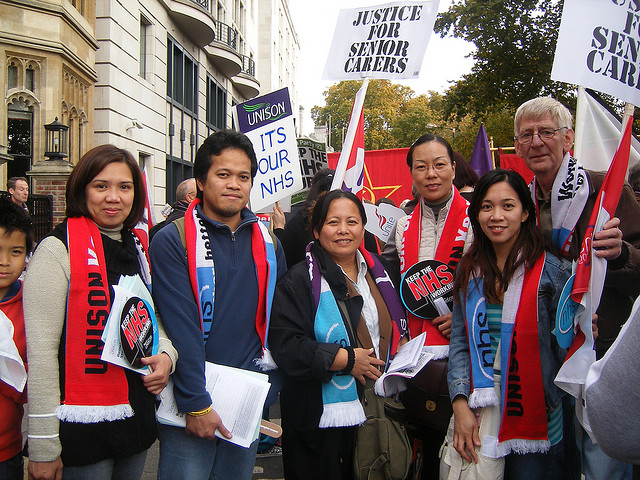On the long road to justice…
Jamima Fagta is our newest chef to join Mazí Mas. Born in the Philippines, Jamima is a community organiser and activist who came to the UK as a political refugee. She will be running a cooking workshop and hosting a pop-up restaurant during the Yam Yam! Food Festival at the Albany Theatre in October. You can buy tickets for Jamima’s pop-up here.
Aside from her wonderful cooking, Jamima also works part-time for Kanlungan, a charity that supports the empowerment of migrant Filipinos in the UK. She is passionate about the rights of undocumented migrant workers and migrant domestic and care workers, and explains some of the issues facing the Filipino community here…
The Filipino community in the UK is estimated by the embassy to be 250,000, most of whom have settled in this country during the last 30 years. Although about half of the community is reckoned to be in London, there are Filipinos all over the UK, often in quite remote areas. By and large, they are nurses in the NHS and private sectors, carers, nannies, domestics, hotel and restaurant workers, communication workers and other service sector workers. The Filipino community has some distinct characteristics. Historically a significant majority of primary migrants to the UK have been women, arriving largely to work in care, health and domestic service. Although many leaders in the community have come to the UK to flee political persecution, (reflecting a high degree of political activism in the Philippines), most Filipinos arrived as work or family migrants.
The Filipino community must deal with the general problems of its life in the UK: thinking about the second generation, including those who arrived as children, managing the relationship with two home countries, acquiring citizenship and getting involved as citizens and dealing with racism. It is also subject to a level of labour exploitation, e.g. care managers paid £7.02 an hour; students often working long hours to support themselves, and people with temporary visa and with documentation problems feeling unable to enforce basic labour rights.
While the overwhelming majority of Filipinos have come to the UK and acquired settlement legally, a growing number are undocumented and have no legal status. One big reason for this is the almost endless changes in immigration rules. In the last several years, the UK government has been introducing more and more restrictive policies, which have produced even more undocumented migrants who have to work for much lower wages below the legal minimum. People may have paid high agency fees in order to get to the UK, and then find themselves trapped in debt, unable to return home and forced to stay and work illegally. But with the work of organisations such as Kanlungan’s sustained campaigns focusing on the unjust situation of migrant workers - primarily Filipinos - since the late 1990s, the UK government granted concessions that gave them immigration status and a route to permanent settlement. Since then, most of them have been able to bring in their families and dependents to live permanently with them in the UK. We now have a new generation of arrivals, doing the same work, but facing new threats to their status in the UK.
The Filipino community is unique in the UK because it is positioned at the heart of many key areas of concern and debate. The main form of immigration to the UK has initially been for work, mostly skilled work in areas of enormous social but very low monetary value like care, nursing and domestic work. These are the types of worker the current government says should not be allowed to settle. The major presence of Filipinos in social and health care, especially the care of an increasingly ageing population, places them in the centre of a worldwide discussion about how we are to look after our elders and how to find people to do it. The UK is trailing behind other countries like US, Canada, Australia, New Zealand and Japan as they move to attract and retain people with these skills.
Now that the community has been in the UK for some decades, it faces new challenges of integration, at a time when the resources for this are cut or non-existent. It also cannot deny that some of its compatriots who have acquired permanent residency cannot fully integrate together with their children or loved ones due to the nature of work and the policies that prevent them to do so. As a result, the (Filipino) children are left with no opportunity to develop their skills, as they have no choice but to do the same jobs their parents do. The community needs to tackle poverty in our community and make sure that we are not reproducing disadvantage in the second generation.










Create Signup Form online…
mazà mas » On the long road to justice …
qr cna class…
mazà mas » On the long road to justice …
Rustoleum countertop paint…
mazà mas » On the long road to justice …
Cardio Before or After Lifting…
mazà mas » On the long road to justice …
inflamp.technikum-wien.at…
mazà mas » On the long road to justice …
create business sign…
mazà mas » On the long road to justice …
not fake…
mazà mas » On the long road to justice …
create online form…
mazà mas » On the long road to justice …
payday loans calgary locations…
mazà mas » On the long road to justice …
injectable steroids Illinois…
mazà mas » On the long road to justice …
best quality Softball steroids…
mazà mas » On the long road to justice …